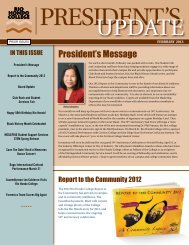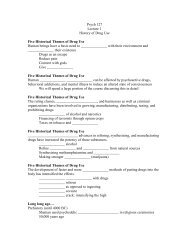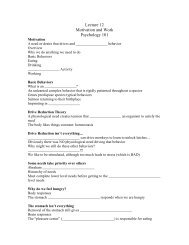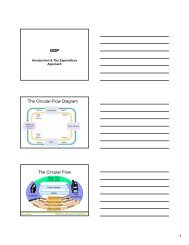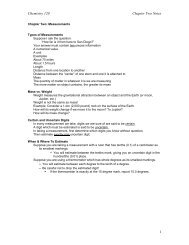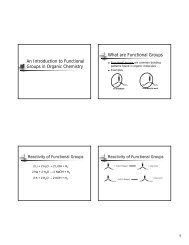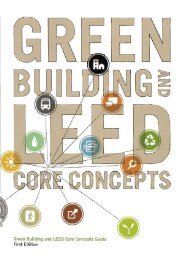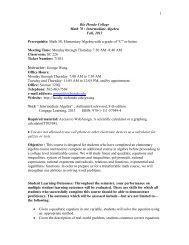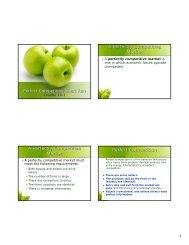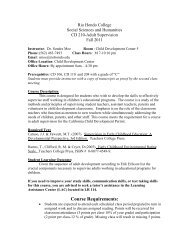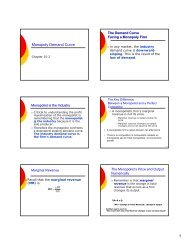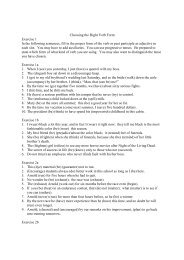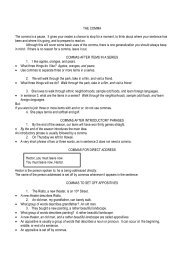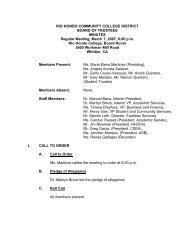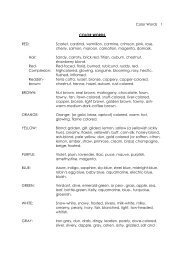Complete College Catalog 2011-2012 - Rio Hondo College
Complete College Catalog 2011-2012 - Rio Hondo College
Complete College Catalog 2011-2012 - Rio Hondo College
Create successful ePaper yourself
Turn your PDF publications into a flip-book with our unique Google optimized e-Paper software.
tools of the astronomer. Area of study<br />
will include, but will not be limited to,<br />
campsites in National Monuments and<br />
Parks in the southwestern United States.<br />
1 to 2 Units<br />
9 to 18 Lecture hours<br />
27 to 54 Lab hours<br />
ASTR 220<br />
Astrobiology: The Search for<br />
Extraterrestrial Life<br />
Prerequisite: ASTR 110<br />
Transfers to: CSU<br />
This course is designed for those<br />
students who are interested in<br />
the most recent information in<br />
the search for extraterrestrial life.<br />
Topics discussed will focus on<br />
the astronomical, biological, and<br />
sociological issues and perspectives of<br />
the search for life beyond Earth.<br />
3 Units<br />
54 Lecture hours<br />
ASTR 299<br />
Directed Study: Astronomy<br />
Transfers to: UC, CSU<br />
The course is intended for students<br />
who have the ability to assume<br />
responsibility for independent work<br />
and to prepare written or oral reports<br />
and/or appropriate projects; who<br />
possess a 2.5 overall grade point<br />
average and/or a 3.0 grade point<br />
average in a major, or for whom the<br />
instructor feels an exception should<br />
be made. Directed Studies may be<br />
developed from any topic arising<br />
from or related to a course of study<br />
that will result in developing depth<br />
and breadth in that subject area.<br />
The project title will vary with each<br />
individual project. Students will be<br />
expected to meet on a regular basis<br />
with their faculty sponsor and submit<br />
a final report or project. One unit of<br />
credit will be awarded for 48 hours<br />
of directed studies, 6 hours of which<br />
must be with an instructor. A student<br />
may take this course for a maximum<br />
of 4 units within a discipline, but may<br />
not accumulate more than a total of 12<br />
units college wide.<br />
1 to 3 Units<br />
48 to 144 Hours<br />
____________________<br />
AUTOMOTIVE<br />
BODY REPAIR<br />
Division of Career & Technical<br />
Education<br />
AUTB 032<br />
Auto Body and Fender Repair<br />
Advisory: READ 022 or appropriate<br />
assessment<br />
This is an introductory course designed<br />
to survey the field of Auto Body Repair<br />
stressing an overall understanding<br />
of the techniques, materials, and<br />
fundamentals currently used in this<br />
area. The course is designed for<br />
students having no previous experience<br />
who desire a broad overview and basic<br />
understanding as a part of their general<br />
technical background or who may be<br />
interested in further specific education<br />
in this field. Sheet metal repairing,<br />
refinishing, tension devices, special<br />
materials handling, and painting are<br />
emphasized. This course may be taken<br />
once and repeated one time for credit.<br />
3 Units<br />
36 Lecture hours<br />
54 Lab hours<br />
AUTB 075<br />
Collision Estimating<br />
Advisory: READ 022 or appropriate<br />
assessment; AUTB 101<br />
This course provides a foundation in<br />
the basic principles and techniques of<br />
automotive collision estimating using<br />
the latest revisions of CCC’s Pathways<br />
Collision Estimating Software. The<br />
course is designed to prepare students<br />
to enter the field of auto collision<br />
estimating with major emphasis placed<br />
on diagnosis of damage, writing a<br />
damage report, and computer assisted<br />
estimates.<br />
3 Units<br />
54 Lecture hours<br />
AUTB 078<br />
Lab and Field Collision Estimating<br />
Advisory: READ 023 or appropriate<br />
assessment; AUTB 075<br />
This is an advanced course in auto<br />
collision estimating and is designed to<br />
enhance computer collision estimating<br />
skills. Students will gain experience<br />
in the estimation process through<br />
the use of estimating software and<br />
vehicle inspections. Topics addressed<br />
will include vehicle damage list<br />
creation, the production of effective<br />
computerized estimates of repairs, and<br />
differentiating between included and<br />
not included operations. This course is<br />
suitable for those students who work<br />
with and would like to further their<br />
understanding of commonly used<br />
computerized collision estimating<br />
systems. This course may be repeated<br />
once to enhance students’ skills and<br />
proficiency.<br />
1 Unit<br />
9 Lecture hours<br />
18 Lab hours<br />
18 Hours<br />
AUTB 080<br />
Automotive Painting I<br />
Advisory: READ 023 or appropriate<br />
assessment<br />
This is an introductory course in the<br />
fundamental aspects of automotive<br />
painting. The course is a study in the<br />
use of spray equipment and special<br />
tools used in automotive painting.<br />
Related technical information is<br />
presented concerning different types of<br />
paint products and finishes, painting<br />
safety, hazardous waste handling and<br />
disposal, and state regulations and<br />
rules used in the automotive paint<br />
industry. This course may be taken<br />
once and repeated one time for credit.<br />
3 Units<br />
18 Lecture hours<br />
108 Lab hours<br />
AUTB 085<br />
Automotive Painting II<br />
Prerequisite: AUTB 080<br />
This is an advanced, industry-based<br />
course in automotive painting<br />
procedures and special effect<br />
materials used in painting. Practical<br />
experience is provided in the use of<br />
spray equipment and special tools<br />
used in automotive painting. Related<br />
technical information is presented<br />
concerning different types of custom<br />
paints and finishes, painting safety,<br />
and paint problem solving techniques.<br />
This course may be taken once and<br />
repeated two times for credit.<br />
3 Units<br />
18 Lecture hours<br />
108 Lab hours<br />
AUTB 090<br />
Advanced Automotive Collision Repair<br />
Advisory: READ 023 or appropriate<br />
assessment; AUTB 130<br />
This course is designed for the<br />
advancement of skills in the art of<br />
automotive collision repair, painting,<br />
customizing, and the repair of<br />
plastics. Major emphasis is placed on<br />
hand and power tool use, theory of<br />
design, complete repair projects and<br />
practicing repair skills for employment<br />
opportunities. This course may be<br />
taken once and repeated two times for<br />
credit.<br />
2 Units<br />
108 Lab hours<br />
AUTB 093<br />
Paintless Dent Removal<br />
Advisory: READ 023 or appropriate<br />
assessment<br />
This course provides an overview<br />
of paintless dent removal methods<br />
and the techniques used to identify<br />
damage and repair vehicles in the<br />
auto collision industry. Lecture,<br />
discussion, and examination of specific<br />
damage and tool usage will be used to<br />
develop student understanding and<br />
skills for locating and repairing minor<br />
damage without the need to repaint.<br />
Demonstrations on body panels and<br />
vehicles will provide the student with<br />
an introduction to the kinds of damage<br />
that can be addressed using paintless<br />
dent removal. This course may be<br />
repeated one time to enhance student<br />
skills and proficiency. This course is<br />
suitable for those interested in the field<br />
of auto collision and paintless dent<br />
removal.<br />
4 Units<br />
36 Lecture hours<br />
108 Lab hours<br />
AUTB 096<br />
Collision Repair Analysis<br />
Advisory: READ 023 or appropriate<br />
assessment; AUTB 101<br />
This course provides an overview<br />
of the investigative methods and<br />
techniques used to identify fraudulent<br />
repairs in the auto collision industry.<br />
Lecture, discussion, and examination<br />
of actual vehicles will be used to<br />
develop student understanding of<br />
and skill in detecting incompetent or<br />
fraudulent repairs. The class consists<br />
of demonstrations on actual vehicles<br />
<strong>2011</strong>-<strong>2012</strong> <strong>Catalog</strong> <strong>Rio</strong> <strong>Hondo</strong> <strong>College</strong> / 143



